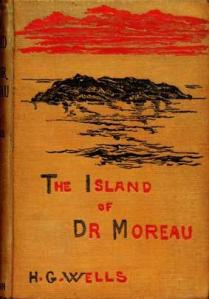H.G. Wells: The Island of Doctor Moreau

Wells’ second published novel after The Time Machine continues in the vein of philosophical speculation upon humanity’s place in nature and upon the scientific age. Suffering only slightly from Wells’ ‘fire and forget’ prose style, the book is still a surprisingly sustained illustration of the dangers not just of vivisection, but of placing science before ethics. The story touches right to the core of even modern concerns about scientific progress in a shockingly vivid and visceral fashion. Perhaps this may go some way to explain why a book which is more coherent than The Time Machine and just as exciting is not more universally acclaimed; it still touches upon something which we still only hesistatingly address today.
The book starts slowly, with the protagonist, Prendick, being cast adrift alone in a dinghy. He is then picked up by a boat travelling to the island of Doctor Moreau with a cargo of animals and carrying his assistant Montgomery. Swiftly cast adrift again after the seamen take a dislike to one Moreau’s more human creations, Prendick is taken in by the Doctor on his island and kept in the dark regarding the true nature of the going’s on. The reason for the slow reveal is obvious as Wells is building up to something truly shocking, but for a modern reader who is already aware of the general nature of the Doctors experiments, it does drag a little.
Finally, following a strange scene in a small village where the beast people congregate that reminds one of nothing so much as Kurtz’ shack in Heart of Darkness, the truth is revealed in a lengthy but well polished infodump from Doctor Moreau in which the horrors he perpetrates are seemingly justified by his scientific explanation. Following this, even Prendick becomes somewhat inured to the grisly affair that he is surrounded by. Inevitably, everything falls apart and Prendick is left to escape and write up his story.
The story at one and the same time links human behaviour with bestialism and separates it, with the animals unable to truly become human and the humans unable to fully become beasts. At the last, a distinction is drawn by Prendick between the two, but he remains a solitary creature, hunted and alone amogst his fellow humans. The novel deals with the dangers of scientists arrogating themselves godlike powers, yet does this subtly without directly addressing the issue nor ramming it down the readers throats. The idea that after Moreau’s inevitable death he still looks down upon his creatures enforcing his laws, and that he will someday return to reinstitute the ‘House of Pain’ are seamlessly grafted into the story reminding one of just how good Wells can be when his craft matches his vision.
The Island of Doctor Moreau is resolutely of its time, containing only passing traces of the institutional misogyny and racism to which Wells was sadly prone at this time, but those who find those aspects of his work unsettling will be floored by the sheer cruelty and horror which the author felt he was able to portray. Of far more interest is the way in which the book exposes the ethical conversation science was having with itself in the dying years of the nineteenth century. Whilst not on an imaginative par with The War of the Worlds, but far exceeding The Time Machine in subtlety and art, the novel remains extremely powerful and despite its themes deserves a place amongst Wells’ best known and most feted works.

